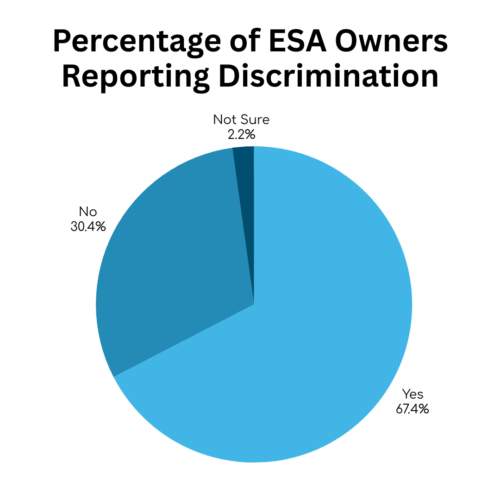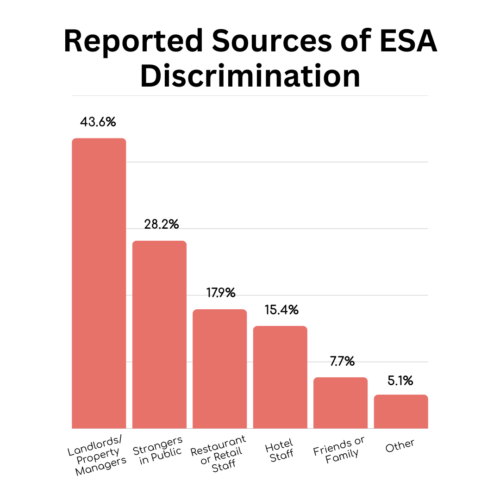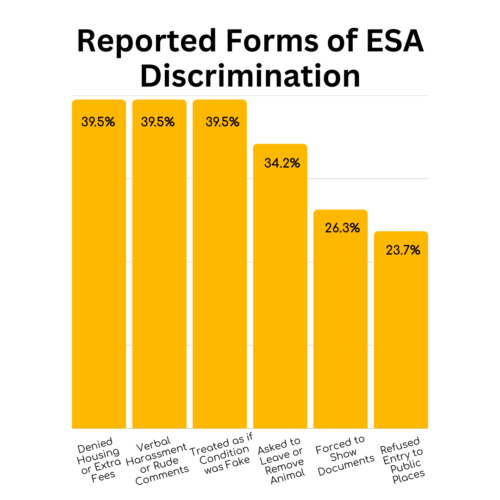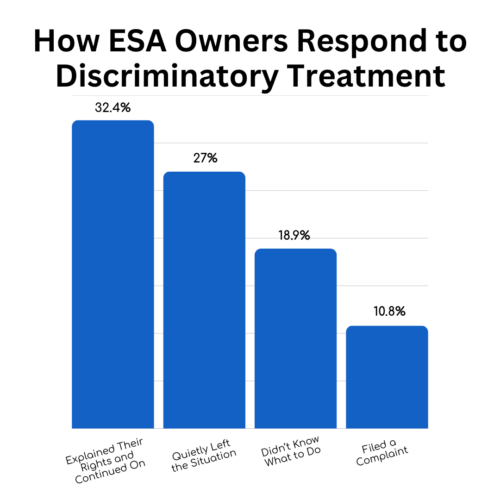
Emotional Support Animal Discrimination: What the American Service Pets Community Is Experiencing
- Published on:
- By: ASP Team
Emotional support animals (ESAs) offer comfort, stability, and mental health benefits—but unfortunately, many ESA owners still face discrimination, judgment, or harassment. At American Service Pets, we wanted to understand how widespread this issue really is among our community. So we asked.
The results were eye-opening.
In this post, we’ll break down the real experiences of ESA and PSA (psychiatric service animal) owners, share survey data from our community, and offer suggestions on how to handle discrimination with confidence and knowledge.
Over Two-Thirds of ESA Owners Report Experiencing Discrimination
A recent community poll uncovered an unsettling reality: 67.4% of ESA and PSA owners have faced discrimination, judgment, or harassment because of their support animal.

This means that more than two-thirds of individuals who rely on emotional or psychiatric support animals are being unfairly challenged for simply seeking the assistance they need.
Get Your ESA Today
Sources of Emotional Support Animal Discrimination Against Pet Owners
Discrimination against Emotional Support Animal (ESA) owners doesn’t stem from a single source—it occurs across a variety of settings. Here’s what our community shared:
- 43.6%: Landlords or property managers
- 28.2%: Strangers in public
- 17.9%: Restaurant or retail staff
- 15.4%: Hotel staff
- 7.7%: Friends or family
- 5.1%: Other (including Airline employees, coworkers, or medical professionals)
These figures highlight the widespread nature of ESA-related discrimination, impacting housing, travel, social interactions, and more.


What Form Does ESA Discrimination Take?
Here’s how our respondents described the discrimination they encountered:
- 39.5%: Denied housing or charged extra fees
- 39.5%: Verbal harassment or rude comments
- 39.5%: Treated as if their condition was fake
- 34.2%: Asked to leave or remove their animal
- 26.3%: Forced to show documentation unnecessarily
- 23.7%: Refused entry to public places
These actions can leave ESA owners feeling anxious, unsafe, or even isolated—despite having the legal right to their animal.
How ESA Owners Respond to Discrimination
When faced with mistreatment, community members took different approaches:
- 32.4%: Explained their ESA/PSA rights and continued on
- 27%: Quietly left the situation
- 18.9%: Didn’t know what to do
- 10.8%: Filed a complaint
- Others reported feeling frustrated, doing nothing, or being denied space to wait with their animal
These varied responses show the need for greater education, confidence, and support.

What ESA Owners Need from American Service Pets
In their own words, ESA and PSA owners shared their most pressing needs:
- “Ensure that retail and grocery stores are informed about the different types of service dogs.”
- “Increase public education.”
- “Raise awareness about the challenges we face.”
- “The medical field is the least accommodating. I was denied care at an urgent care clinic.”
Many also emphasized the importance of keeping their animals close or carrying them for safety and personal health, a necessity often misunderstood by others.
How American Service Pets Is Taking Action
We hear you. At American Service Pets, we’re dedicated to the following commitments:
- Educating the public: Raising awareness through engaging blogs, videos, and social media content
- Empowering ESA owners: Providing clear documentation and guidance to help you understand and exercise your rights
- Enhancing support tools: Offering items like ESA ID tags, harnesses, and leashes to ensure better recognition in public spaces
We believe being seen and respected is essential, and we’re here to ensure that happens.
Common Questions Answered
How can I legally prove my emotional support animal is legitimate?
The best way is through official ESA documentation, like the ones provided through American Service Pets. Our certified evaluations ensure your ESA is recognized under federal housing laws and state protections.
What should I do if someone denies me housing or access with my ESA?
You have rights. Explain them calmly, show your ESA documentation, and contact our team if you need help. ESA owners are protected under the Fair Housing Act, and American Service Pets offers guidance for these situations.
Do ESA accessories like tags or leashes help reduce discrimination?
Yes. Products like the American Service Pets ESA Tag or ESA Harness clearly communicate your animal’s role to the public, helping avoid misunderstandings and reducing the chance of being challenged.
What are some examples of discrimination ESA owners have faced?
From being denied urgent care to being refused hotel entry, many ESA owners experience unjust treatment. According to our poll, 39.5% were denied housing or verbally harassed, and nearly one-third were questioned in public.
How can I report ESA discrimination?
Start by documenting the incident, saving messages or photos, and filing a formal complaint with housing authorities or relevant management. American Service Pets can offer additional support through resources and letters.
Raising Awareness Together
This poll revealed an uncomfortable truth: Emotional Support Animal discrimination is real, widespread, and emotionally taxing.
But it also showed the resilience and strength of our community.
With continued support, public education, and accessible tools from American Service Pets, we can create a more understanding world—where emotional support animals are not just seen, but respected.
Together, we’ll keep advocating.

The benefits of an Emotional Support Animal certification and a Psychiatric Service Dog certification are drastically different. Fortunately for you, American Service Pets’ network of active board certified doctor or other licensed mental health providers can help you find the right path to certification. To find out whether you need an ESA or PSD letter, take our easy, three-step Pet Owner Survey!
More Great Resources





